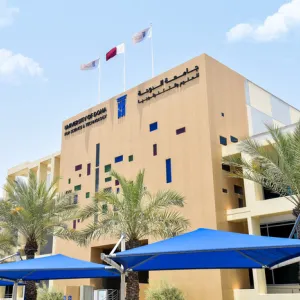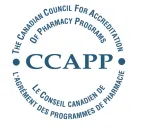
The Diploma in Pharmacy Technology (Dip. PT) is a two year diploma that prepares graduates for licensing as a Pharmacy Technician in Qatar. The Dip. PT program is founded on the National Association of Pharmacy Regulatory Authorities (NAPRA) Professional Competencies for Canadian Pharmacy Technicians and the Canadian Council for the Accreditation of Pharmacy Programs (CCAPP) accreditation standards. An integration of classroom theory, laboratory skills, and field experience prepares graduates to practice under the supervision of the pharmacist, to perform medicine distribution and supply roles including the processing of prescriptions, secure storage, assembly, repackaging and compounding of medicines. The Dip. PT prepares graduates for entry-level positions in hospitals, primary health care facilities, clinics, and community pharmacies. Graduates are prepared for future education in the Bachelor of Science in Pharmacy Technology.
Program Duration:
Accreditation:
The Diploma in Pharmacy Technology Program has been awarded International Accreditation status by the Canadian Council for Accreditation of Pharmacy Programs for a three-year term ending June 30,2028.

Admission Requirements:
2. A valid (within two years) IELTS Academic Test Report Form with an overall band of 5.0 with no individual band score (reading, writing, speaking, and listening) below 5.0; OR
3. Successful completion of Foundation Year in Health Sciences.
2. A valid SAT Report Form with minimum score of 480; OR
3. Successful completion of Foundation Year in Health Sciences.
2. Documented proof of current Basic Life Support for Health Care Providers Level 3 certification at the time of enrolment or within one month of commencement of the program.
3. Students are responsible to maintain current immunizations and BLS certification throughout the duration of the program. These requirements may change during the program as determined by the Qatar Ministry of Public Health and clinical partners hosting student placements.
4. Personal Protective Equipment (PPE) such as scrubs and lab coats are needed for labs and clinical practicums.
5. It is the student’s responsibility to arrange transportation to and from clinical practicum sites. 6. Additional program costs may include textbooks and a mobile phone which supports access to specialized applications.
To see the 2022-2023 Study Plan pages, please CLICK HERE!
To see the 2023-2024 Study Plan pages, please CLICK HERE!
To see the 2024-2025 Study Plan pages, please CLICK HERE!
2026-2027 Study Plan:
| COURSE NUMBER |
COURSE TITLE | REQUISITE | HOURS/WEEK | |||
|---|---|---|---|---|---|---|
| Pre-req | CO-req | CR | LEC | LAB | ||
| SEMESTER 1 | ||||||
| BIOL1110 | Anatomy & Physiology I | - | - | 4 | 3 | 3 |
| CHEM1030 | Health Sciences Chemistry | - | CHEM1031 | 3 | 3 | 0 |
| CHEM1031 | Health Sciences Chemistry (Lab) | - | CHEM1030 | 1 | 0 | 3 |
| COMM1010 | English Communication I | - | - | 3 | 3 | 0 |
| HSPT1101 | Pharmaceutical Calculations I | - | - | 3 | 3 | 0 |
| Semester 1 Total: | 14 | 12 | 6 | |||
| SEMESTER 2 | ||||||
| BIOL1210 | Anatomy & Physiology II | BIOL1110 & BIOL1111 | BIOL1211 | 4 | 3 | 3 |
| COMM1020 | English Communication II | COMM1010 | - | 3 | 3 | 0 |
| HSPT1201 | Pharmacy Computer Systems | - | - | 3 | 2 | 3 |
| HSPT1202 | Pharmaceutical Calculations II | HSPT1101 | - | 3 | 3 | 0 |
| HSPT1203 | Pharmacy Management & Inventory Control | - | - | 3 | 3 | 0 |
| Semester 2 Total: | 16 | 14 | 6 | |||
| SEMESTER 3 | ||||||
| BIOL1310 | Introduction to Pathophysiology | BIOL1210 & BIOL1211 | - | 3 | 3 | 0 |
| HSPT1301 | Pharmacy Regulations & Professionalism | - | - | 3 | 3 | 0 |
| HSHG2080 | Ethics in Healthcare | - | - | 3 | 3 | 0 |
| Semester 3 Total: | 9 | 9 | 0 | |||
| Year 1 Total: | 39 | 35 | 12 | |||
| COURSE NUMBER |
COURSE TITLE | REQUISITE | HOURS/WEEK | |||
|---|---|---|---|---|---|---|
| Pre-req | CO-req | CR | LEC | LAB | ||
| SEMESTER 4 | ||||||
| HSPT2101 | Prescription Processing | HSPT1201 & HSPT1202 | - | 4 | 2 | 4 |
| HSPT2102 | Pharmacology I | BIOL1210 & BIOL1310 | - | 5 | 5 | 0 |
| HSPT2103 | Community Pharmacy Practice | BIOL1310 | - | 4 | 3 | 3 |
| HSPT2104 | Medication Safety, Quality & Drug Reconciliation | - | - | 3 | 3 | 0 |
| Semester 4 Total: | 16 | 13 | 7 | |||
| SEMESTER 5 | ||||||
| HSPT2201 | Hospital Pharmacy Practice | HSPT1201 & HSPT1202 | - | 3 | 2 | 3 |
| HSPT2202 | Aseptic Technique | HSPT1201 & HSPT1202 | - | 4 | 2 | 6 |
| HSPT2203 | Pharmacology II | HSPT2102 | - | 5 | 5 | 0 |
| HSPT2204 | Nonsterile Compounding | HSPT1201 & HSPT1202 | - | 3 | 2 | 3 |
| Semester 5 Total: | 15 | 11 | 12 | |||
| SEMESTER 6 | ||||||
| HSPT2300 | Clinical Work Term | HSPT2201 & HSPT2202 & HSPT2203 & HSPT2204 | - | 6 | 0 | 40 |
| Semester 6 Total: | 6 | 0 | 40 | |||
| Year 2 Total: | 37 | 24 | 59 | |||
| Program Total | 76 | 59 | 71 | |||
Graduate Future Pathways:
Graduates of the Diploma in Pharmacy Technology (Dip. PT) program may choose to continue their studies and complete the Bachelor of Science in Pharmacy Technology (B.Sc. PT) program.
Graduate Career Opportunities:
Graduates find employment in both Hospital and Community Pharmacy Settings. A wide range of career opportunities in the field currently exist and include, but are not limited to, the following:
- Clinical Pharmacy Technician
- Insurance Company Clerk
- Pharmacist Assistant
- Hospital Pharmacy Technician
- Community Pharmacy Technician
- Retail Pharmacy Clerk
- Home Health Care Assistant
- Pharmaceutical Research Assistant
Program Contact:


